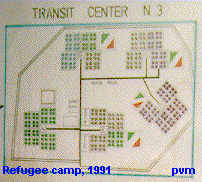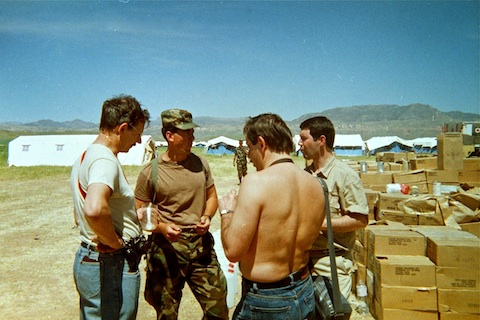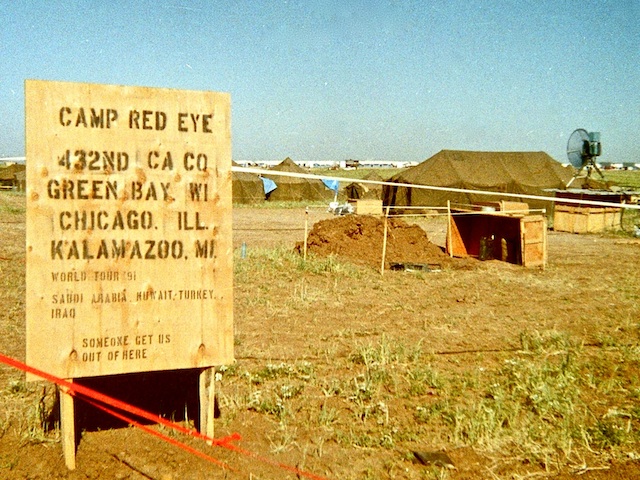The Kurdish Detour
 Zakho, Iraq—Frustrations caused by such problems as double dipping, on top of the incessant questions about seemingly trivial issues, could only be alleviated in the minds of the troops and interpreters dealing with the Kurds by reflecting on the hardships of their ilfe. And the hardships were glaring. Daily meals depended on the amount of scrap paper and twigs that could be scavenged off the ground, or out of garbage containers. In fact, American garbage became a multipurpose commodity. Families benefitted by the treasures their children could salvage from the company dump. There was no end to the recyclable containers or burnable cardboard found in the garbage.
Zakho, Iraq—Frustrations caused by such problems as double dipping, on top of the incessant questions about seemingly trivial issues, could only be alleviated in the minds of the troops and interpreters dealing with the Kurds by reflecting on the hardships of their ilfe. And the hardships were glaring. Daily meals depended on the amount of scrap paper and twigs that could be scavenged off the ground, or out of garbage containers. In fact, American garbage became a multipurpose commodity. Families benefitted by the treasures their children could salvage from the company dump. There was no end to the recyclable containers or burnable cardboard found in the garbage.
For the children, the adventure was fabulous. The raids on the dump turned into pep rallies for the Green Bay Packers, while less complimentary cheers were raised for the Chicago Bears. Hundreds of kids got into the act; and when the unit’s motors team wasn’t leading the cheers at the dump, the kids converged on the garbage trailer parked in the mess area. The role of the motors team then changed from cheer leaders to riot control. A successful raid by the kids could leave the mess area “messed” beyond recognition. The excitement provided by uncontrollable mobs however was not confined to the mess area. The in-processing center also provided excitement, and the kids were not innocent there either.

McMurry’s Notes
- Chameju, Iraq—When Captain Scholz and I were up in the mountains, one of our favorite forms of entertainment was burning ants. Northern Iraq had plenty of ants — and scorpions, centipedes and spiders — to spare. They were so many creepy-crawlies that if you didn’t shake out your boots and clothes in the morning you were just asking for another painful bug bite.
- Camp Redeye disposed of its garbage by trucking it a couple of hundred meters to a burn pit in the shallow valley that separated it from the Kurd tents. The Kurd kids would follow along, trying to get candy from the soldiers on the truck. The soldiers would blast the kids with Super Soakers and the kids would respond with bramble grenades. PFC Todd Inman taught the kids to chant “The Bears still suck!” (The Bears are Green Bay’s football rival. Todd later died training for the Bosnia mission in 1995.) Television news even filmed the parade.
It was cute at first, but by the time I returned from the mountains the kids had started raiding the garbage before it left camp. We tried keeping them out with fusillades of rocks, but after they realized we weren’t throwing to hurt, they got their bravery back. We had previously hired some Kurd men to guard the camp gates, so they were given the additional duty of goon squad. If we saw a kid raiding the garbage, we would notify the guards and they would wail on the kid with sticks. Since Kurds look at discipline as a community responsibility, it didn’t cause problems with the parents. And because we didn’t do it, it didn’t cause public relations problems with the media.

Camp Redeye: 432nd Civil Affairs World Tour. Someone get us out of here! - First and second letter I sent home on May 29.
- While I was working in Camp 2, we occasionally noticed Kurds with $100 bills. For people who make their living grazing goats, it was unusual. The 1/4″ solid-green square in the middle of Ben Franklin’s cheek branded them as obvious forgeries. Since no one in my chain-of-command seemed too concerned about what was probably an attempt by Iraqi intelligence to undermine the U.S. economy, I did something about it myself.
I hitched a ride into Zakho, then strolled along the main drag, which is where the Kurds gathered to sell bayonets and cigarettes to the troops, and gasoline to each other. Somehow I managed to talk one Kurd into letting me look at his $100 bill. When he asked for it back I said “no”, I had to take it turn it in to the MPs. It wasn’t the wisest thing I’ve ever done. A crowd started gathering as I edged my way towards the MP compund which was just a few hundred meters away. Luckily, before things could get ugly, I was able to wave down a passing U.S. vehicle which took me and the Kurd to the MPs. I guess the Kurd thought the MPs would help him get his money back. They didn’t. I filed a report with the provost marshall, and the MPs grilled the Kurd. I felt sorry for him because he obviously wasn’t guilty of anything other than not knowing what U.S. money looked like; plus, it was probably his life savings. But U.S. authorities were unaware of the counterfeiting, they needed a sample $100 bill, and my country’s security was more important than the Kurd’s feelings.
| Page 27 | Page 28 | Page 29 |
